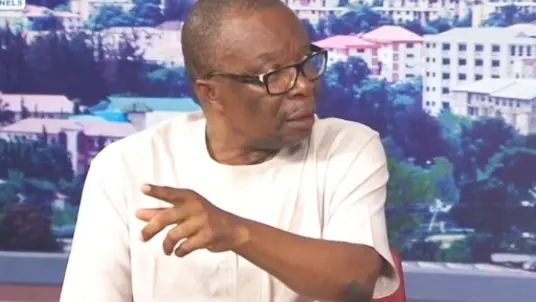Godfatherism has crept into university system – ASUU President
Chairman of the Academic Staff Union of Universities (ASUU), Prof Emmanuel Osodeke, says the problem of godfatherism has entered the university system. Speaking in Abuja during an event to mark 60 years anniversary of Committee of Vice Chancellors of Nigerian Universities (CVCNU), on Monday, Osodeke said universities should be run like they were during the […]

ASUU National President, Prof Emmanuel Osodeke
Chairman of the Academic Staff Union of Universities (ASUU), Prof Emmanuel Osodeke, says the problem of godfatherism has entered the university system.
Speaking in Abuja during an event to mark 60 years anniversary of Committee of Vice Chancellors of Nigerian Universities (CVCNU), on Monday, Osodeke said universities should be run like they were during the 60s and 70s when there were little or no interference from government officials.
He said we must take our universities to the uni-versatility of universities not to region universities.
The ASUU chairman explained that the university first generation lecturers were those with first class and second class upper who sought to be lecturers even when they had opportunity to be in banks.
New N-Power Will create 5 million jobs, says FG
Could Legislation Prohibiting Loot Boxes Spell the End for FGO?
He further said the third generation lecturers were those with third class and HND who went for post graduate diploma to enter university system through godfatherism while the fourth one are those who wants to make money from the system.
“Unfortunately when the first and second generation of lecturers are retiring and leaving the country, the system is being dominated by third and fourth generation of lecturers,” he said.
He said universities no longer follow the process of advertising and letting people apply for the position and get interviewed to get into the university but rather they come in through godfatherism.
“Today, before a vice chancellor can employ any lecturer he has to go and get permission from head of service and when he employs, he has to go to Accountant General office to beg for people employed to be paid salary,” he said.
“How can we run a system like that? We should be sad there is nothing to celebrate. Our job as vice chancellors are on line, there is need for unbundle of the stranglehold of the bureaucrat in Nigerian university system, let them run the way they are run in 60s and 70s, now we are in big crisis, we must take our universities to the uni-versatility of universities not to region universities,” he said.
Osodeke also decried the state of inadequate lecturers and funding in the system, saying, the least budget for education in Africa is 12 per cent but in Nigeria it was 3.8 per cent last year.
Minister of Education, Prof Tahir Mamman, said as government approved payment of salary increase of 35 percent to academics and 25 percent to non-academics as further commitments to the welfare of the staff, the payment for the revitalization of the tertiary institutions was underway.
Mamman also disclosed that with regards to power (energy), steps have been taken to power the universities through gas powered facilities using the PPP window provided by the government.
“The scheme is intended to start with 18 universities in the first instance and the shortlisted universities will be contacted appropriate stage of the project. The centrality of the power to service delivery, research and cost savings cannot be over emphasized,” he said.
He noted that due to the recognition of the centrality of the education sector, a committee was set up to provide a roadmap to guide policy, provide implementation plans, deliverables, key performance indicators (KPIs) and timeline was put in place and that the report of the committee is expected to be submitted this month.
While noting that arrangements had been concluded for a meeting with heads of key security outfits and the Minister of Education to review and enhance the security cover in schools, the minister said the role of government is to continue to support the public sector universities with appropriate resources while encouraging the proper development of the private universities that are now in the greater numbers.
